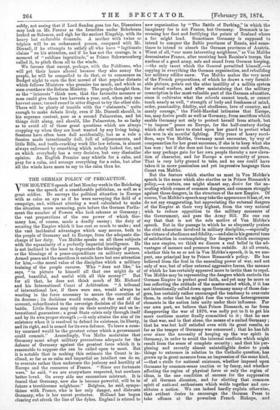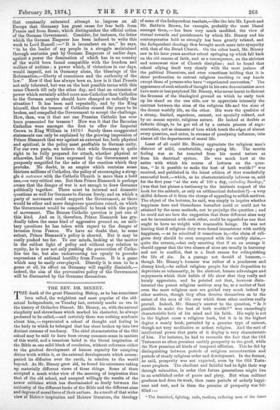THE GERMAN POLICY OF PRECAUTION.
VON MOLTKE'S speech of last Monday week in the Reichstag was the speech of a considerable politician, as well as a
great soldier. He surveys the political situation in Europe with as calm an eye as if he were surveying the field of a campaign, and, without uttering a word calculated to make the situation more menacing, puts before the German Parlia- ment the number of Powers who look askance at Germany ; the vast preparations of the one power of which Ger- many has, of course, made a deadly enemy ; the duty of securing the Empire which it has cost so much to make ; and the vast incidental advantages which may accrue, both to the people of Germany and to Europe, from the adequate dis- charge of her duty. Von Moltke speaks on all these subjects with the equanimity of a perfectly impartial intelligence. He is not inclined in the least to depreciate the blessings of peace, or the blessings of a peace-expenditure on military matters. Armed peace and the sacrifices it entails have but one attraction for him,—the moral value of the discipline which a military training of the people ensures. Who " does not like," he says, " to picture to himself all that one might do of good, beautiful, and useful with all this money ?" But for all that, he does not think much of Mr. Richard and his International Court of Arbitration. "A tribunal of international law, if there were one, would always be wanting in the force necessary to assure the execution of its decrees ; its decisions would remain, at the end of the account, subordinated to the sovereign decision of the field of battle. Little States may rely on their neutrality and on in- ternational guarantees ; a great State exists only through itself and by its own proper strength ;—it only attains the aim of its existence when it is resolved to defend its existence, its liberty, and its right, and is armed for its own defence. To leave a coun- try unarmed would be the greatest crime which a government could commit." Accordingly, Von Molke maintains that Germany must adopt military precautions adequate for the defence of Germany against the greatest force which it is reasonable to suppose she can be called upon to meet. But it is notable that in making this estimate the Count is in- clined, so far as so calm and impartial an intellect can do so, to overrate rather than underrate the jealousy and hostility of Europe and the resources of France. " Since our fortunate wars," he said, " we are everywhere respected, but nowhere better loved. On every side one encounters mistrust. It is feared that Germany, now she is become powerful, will be in future a troublesome neighbour." Belgium, he said, sympa- thises with France, who is her only danger, and distrusts Germany, who is her surest protector. Holland has begun clearing out afresh the line of the dykes. England is stirred to
new organisation by " The Battle of Dorking," in which the imaginary foe is not France, but Germany. Denmark is in- creasing her fleet and fortifying the points of Zealand where a foe might land. Sometimes Germany is supposed to intend to conquer the Baltic provinces of Russia, and some- times to intend to absorb the German provinces of Austria. Worst of all, "our more interesting neighbour," as Von Moltke denominates France, after receiving back Bazaine's troops, the nucleus of a good army, safe and sound from German keeping, —the only taunt which the General permitted himself,—is copying in everything the German organisation, and rebuilding her military edifice anew. Von Moltke makes the very most of the French preparations, of which he draws a very formid- able picture, points out the utter inutility of a militia system for actual warfare, and after maintaining that the military conscription is the most valuable part of the German education, since it cultivates what the schools cannot teach, or cannot teach nearly as well, " strength of body and freshness of mind, order, punctuality, fidelity, and obedience, love of country, and manly courage," the Field-Marshal intimates that Europe, too, may derive profit as well as Germany, from sacrifices which enable Germany not only to protect herself from attack, but " to impose " peace on Europe, for the half-century during which she will have to stand upon her guard to protect what she won in six months' fighting. Fifty years of heavy sacri- fices, says Von Moltke, Germany must encounter, by way of compensation for her great successes, if she is to keep what she has won ; but if she does not fear to encounter such sacrifices, she may perhaps gain for her own people thereby a new eleva- tion of character, and for Europe a new security of peace. That is very lofty ground to take, and no one could have taken it in more passionless and yet impressive language than Count von Moltke.
But the feature which startles us most in Von Moltke's speech is the same which also startles us in Prince Bismarck's policy,—a certain, one might almost say, desire for the an- nealing which comes of common dangers, and common struggle against those dangers, in the structure of the new Empire. Of course, Von Moltke's speech may take the appearance it has, of, we do not say exaggerating, but appreciating the external dangers of the'Empire at their very highest, from the very natural wish to reduce opposition to the military measures of the Government, and pass the Army Bill. No one can say that that is not the sole motive of Von Moltke's speech. But in the passage in which he so eloquently praises the civil education involved in military discipline,—especially the virtues of obedience and fidelity,—and also in his general tone of satisfaction in contemplating the dangers which encompass the new empire, we think we discern a real belief in the ad- vantages of menace and pressure from outside. At all events, whether this be so or not in Von Moltke's speech, it is, we sus- pect, one principal key to Prince Bismarck's policy. He has believed from the first in the annealing power of war, and not only of war, but of other external aggressive forces, the menace of which he has certainly appeared more to invite than to repel. Von Moltke may be representing the dangers which encircle the German Empire in perfect good faith, and yet may be more or less reflecting the attitude of the master-mind which, if it has not intentionally called down upon Germany many of those dan- gers, has certainly rather encouraged the tendency to over-rate them, in order that he might fuse the various heterogeneous elements in the nation into unity under their influence. For our own part, we believe that Prince Bismarck, so far from disapproving the war of 1870, was sadly put to it to get his more cautious master finally committed to it ; that he saw in that war, and in that alone, the means of a united Germany ; that he was but half satisfied even with its great results, so far as the temper of Germany was concerned ; that he has felt ever since the necessity of keeping up the war spirit in Germany, in order to avoid the internal conflicts which might result from the sense of complete security ; and that his per- plexing and recently almost unintelligible desire to push things to extremes in relation to the Catholic question, has grown up in great measure from an impression of the same kind, —that a strife for national existence, whether imposed upon Germans by common-sense caution or by fancy, and whether affecting the region of physical force or only the region of ideas, is the one condition of success for the suppression of all German disunion, and for eliciting that common spirit of national enthusiasm which welds together and con- stitutes a nation. We can indeed hardly explain otherwise, that evident desire to encourage the German Press to take offence at the powerless French Bishops, and that constantly reiterated attempt to , impress on all Europe that Germany has great cause for fear both from France and from Rome, which distinguishes the official action of the German Government. Consider, for instance, the letter which the German Emperor has been induced to write this week to Lord Russell :—" It is incumbent on me," he says, "to be the leader of my people in a struggle maintained through centuries past by German Emperors of earlier days, against a power the domination of which has in no country of the world been found compatible with the freedom and welfare of nations ; a power which, if victorious in our days, would imperil, not in Germany alone, the blessings of the Reformation,—liberty of conscience and the authority of the law." Now if that has always been so, how is it that Prussia not only tolerated, but was on the best possible terms with this same Church till only the other day, and that an extension of power which certainly added more non-Catholics than Catholics to the German sceptre should have changed so radically the situation ? It has been said repeatedly, and by the King himself, that the treason of Catholics caused the peace to be broken, and compelled•the Government to accept the challenge. How, then, was it that not one Prussian Catholic has ever been prosecuted for treason ? How was it that the Bavarian Catholics were amongst the first to offer the Imperial Crown to King William in 1870 ? Surely these exaggerated statements can only be explained by the growing impression of Prince Bismarck that war against an external foe, both physical and spiritual, is the policy most profitable to German unity. For our own parts, we believe that while Germany is quite right to be fully prepared for attack, whether physical or otherwise, half the fears expressed by the Government are purposely magnified for the sake of the reaction which they provoke. No doubt, in an empire which contains some thirteen millions of Catholics, the policy of encouraging a strug- gle a outrance with the Catholic Church is more than a bold one,—a very critical one. But then Prince Bismarck is perhaps aware that the danger of war is not enough to draw Germans politically together. There must be internal and domestic questions as well for Germans to discuss freely, and on which a party of movement could support the Government, or there would be other and more dangerous questions raised, on which the Government would be compelled to break with the party of movement. The Roman Catholic question is just one of this kind. And on it, therefore, Prince Bismarck has gra- dually taken the same kind of aggressive ground as, on mili- tary questions he has taken with regard to the danger of invasion from France. We have no doubt that, to some extent, Prince Bismarck's policy is shrewd. But it may be easily pushed too far. To our minds, looking at the matter in the coldest light of policy and without any relation to equity, he is now not only pushing the persecution of Catho- lics too far, but also endeavouring too openly to provoke expressions of national hostility from France. It is a game which may be easily over-played. Directly it is seen to be a game at all, its effect on Germany will rapidly diminish,— indeed, the aim of the provocative policy of the Government will be discounted by the Germans themselves.



































 Previous page
Previous page